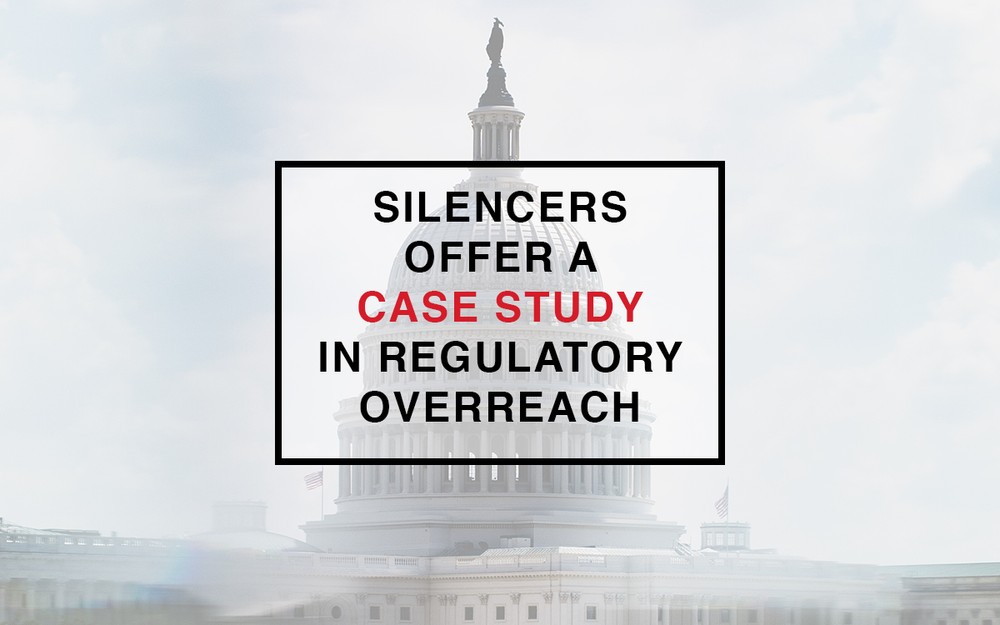

In introducing a bill earlier this year that would ban firearm silencers, a sitting U.S. congresswoman stated that the devices "have no legal application."
On the surface, this might seem like a simple case of misinformation, but it's actually something bigger and more dangerous: a crucial ingredient in a playbook used to enable regulatory overreach and to weaken constitutional rights. Indeed, the restrictions on firearm suppressors illustrate many hallmarks of overly restrictive, unconstitutional regulation.
In the face of such overreach, it is tempting to get behind groundbreaking pro-Second Amendment laws, such as a new suppressor law in Texas. But as we'll see, the quick fix is unlikely to be a lasting, satisfactory solution.
History has shown us that mistruths are often used as a cudgel to restrict constitutional rights. And they are usually not as simple to refute as the one above. Suppressors, also known as silencers, are safety devices used by thousands of Americans to protect their hearing while hunting or target shooting and reduce environmental noise pollution. They certainly are not intended for "criminals trying to avoid detection," as one ill-informed senator put it. The noise of a suppressed firearm is typically 115-140 dB — comparable to a jackhammer on concrete or a jet engine. Hollywood has made fools of nearly everyone unfamiliar with firearms.
Mistruths go hand-in-hand with fearmongering. Drawing a link between something you don't like and crime is a go-to tactic, but the reality is that the use of suppressors in crimes is so statistically insignificant that it isn't even reported in public crime statistics. Sadly, lies are often repeated, even by those who know better, because they make unreasonable regulation seem reasonable.
Another tool is indirect obstruction. There are a number of overt federal restrictions on the books against silencers — a $200 tax, paperwork, and background checks, for instance. But there is also an average wait time of 3-12 months, with any outliers being on the longer end of the wait. There is not a mandated minimum wait time nor an established maximum.
It’s natural for law-abiding gun owners to be dissuaded from owning a device that protects their hearing due to the sheer amount of hoops they have to jump through. Thus, when the onerous rules already on the books aren't enough, Second Amendment opponents can pursue indirect tactics — delay, confusion — to obstruct the rights of citizens.
A third hallmark of regulatory overreach is when local norms and restrictions are forced on the whole country, usually with federal backing. Take other recent suppressor news, the "HEAR" Act, as an example. Although silencers are already illegal in New Jersey, a representative and senator from the Garden State introduced this bill to make it unlawful for citizens to import, sell, manufacture, transfer or possess silencers. Not satisfied to be in the minority, opponents of the Second Amendment will gladly force their rules on the rest of the country under cover of “regulating interstate commerce.”
So when overreaching regulators misinform, obstruct, and steamroll the will of the people, what hope is there?
A bill that recently cleared the Texas state legislature tries to chart a way. But while the bill's intention and direction are spot on, it puts ordinary citizens on perilous ground against the federal government and doesn't hold out much hope of serving as a lasting solution.
By way of background, the Suppressor Freedom Act does several things: First, it clears Texas' restrictions on silencer ownership, which was previously tied to federal laws. Second, it prohibits state resources from being used to enforce federal restrictions on silencers. Lastly — critically — the bill claims that silencers made and sold in Texas are exempt from federal regulations, given the Constitution's Commerce Clause.
This is an attempt to fight back against onerous federal regulations with a potentially monumental new precedent. But unfortunately, it relies on citizens risking violations of federal law, counting on court decisions to vindicate them later — the chances of this are mixed at best. In sum, it's an end-around.
In the end, the only way that Americans will be able to roll back unjustified or insensible restrictions on silencers and other freedoms will be by winning battles on the same battlefield as always: in Congress and at the national level. That requires hard work — correcting deceitful rhetoric, rolling back misguided laws and regulations, and building broad legislative coalitions. But if we want liberty that lasts, we have to do it the right way.





